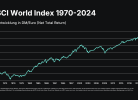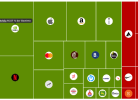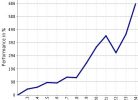By MITCH ZACKS
I have been hearing a common refrain in the financial news and from readers: the financial markets are not accurately pricing the grim realities of the economic situation in the U.S. and abroad; stocks are too expensive; the election is going to throw markets into disarray; tech is overvalued! The list goes on.
Many see an economy puttering forward, while the stock market signals a v-shaped recovery. The disconnect is throwing a lot of people off.
None of the above observations are market myths, but the line of reasoning that leads to these observations sometimes are. Here are four to watch for in the fourth quarter.
Market Myth #1: The Stock Market and the Economy are Too Disconnected
The key element to understand here is that the stock market is a leading indicator for the economy. Case-in-point: historically, markets reach a bottom about four months before a recession officially ends. As I’ve written before, stocks do not tend to wait for good news.
As such, the stock market being disconnected from the economy is not necessarily an anomaly – it’s the norm. In past economic cycles, we have seen an economy beset by job losses, rising uncertainty, and relentlessly negative news coverage, all while the stock market rallies. After the 2008 Financial Crisis, it was not until late fall 2009 when improvements in the labor market became visible. By then, the bull market was already six months old.
In my view, the stock market today is arguably pricing-in what the economy will look like a year from now, and what the market sees is significant pent-up demand, a fading pandemic-induced economic impact, and a wall of liquidity coursing its way through capital markets (with maybe more on the way).
Market Myth #2: This Election Will Make or Break the Economy and Stock Market
There is little doubt that this U.S. election cycle is about as contentious as it gets. Depending on your political orientation, you may think a victory for the other side will have damaging consequences for the economy and the market. Fortunately, history does not provide the same conclusion:
S&P 500 Average Annual Performance, 1933 – 2019
Source: Strategas Research. To note: the above returns exclude 2001-2002, as power in the Senate changed hands three times in that period.

Source: Strategas Research. To note: the above returns exclude 2001-2002, as power in the Senate changed hands three times in that period.
At Zacks Investment Management, we maintain a politically agnostic approach to investing. This approach is not to say that politics or policies do not matter – they do. But in our view, it makes better sense to form an investment thesis once policies are known and appear poised to be enacted into law. In other words, it’s better for investors to watch what politicians do, not what they say.
Market Myth #3: Valuations are Too High
With corporate earnings still inching back to pre-pandemic levels – but with the stock market also near all-time highs – valuations have pushed higher. In previous investment cycles, investors would have looked warily at an S&P 500 trading at over 20x forward earnings. Today, not so much. Why?
In my view, the best answer is: interest rates. Near-zero interest rates have implications for nearly all asset classes, not just bonds. If an investor can expect to earn only 1% on a 10-year U.S. Treasury, the desire for a better return is likely to nudge them further out on the risk curve – often into stocks.
Think of this another way – if the risk-free rate is 1%, investors may reasonably demand a return of 4% from stocks, factoring-in a 3% “equity risk premium.” An earnings yield of 4% on stocks implies a P/E ratio of 25, signaling investors may even by comfortable with valuations drifting higher from here.
Market Myth #4: The Technology Sector is in a Bubble Like 1999
Technology in particular has seen valuations drift materially higher, spurring concern that a bubble is forming akin to the one in 1999. There are several key differences between now and 1999, however:
- The magnitude of the late 1990’s rally was far more extreme, particularly for companies with zero or negative earnings (of which there were many).
- An equally-weighted index of Technology stocks shows them trading at 26.89x forward earnings, almost half the P/E levels experienced in 2000.
- Near-zero interest rates are pushing investors further out onto the risk curve, and technology companies offer robust earnings growth and free cash flow – even if they’re a bit expensive.
- Investors may be underappreciating the emergence of a technology “super-cycle,” where tech dominance and growing market share of the economy could continue.
To be fair, many technology stocks are quite expensive and trade at exorbitant prices relative to earnings and free cash flow. But not all of them do, and investors should take care and perform due diligence when establishing your portfolio exposure to the sector.
Bottom Line for Investors
As we approach the election and the end of the year, investors may be lured increasingly into lines of reasoning that are based less on fact and more on emotion. Some of these lines of reasoning may be market myths, and investors should try to avoid the ‘traps.’
When the investment and/or political and social environment feel uncertain, it is important to redouble your efforts to make investment decisions based on fundamentals and what we know about equity markets from history. Doing so usually results in taking a steady, patient, long-term-oriented approach, which is where a majority of investors need to land.
Wenn du keinen Beitrag mehr verpassen willst, dann bestell doch einfach den Newsletter! So wirst du jedes Mal informiert, wenn ein neuer Beitrag erscheint!









Geht´s auch mal auf deutsch?
Regelmäßig. Mal eine ganz andere Frage: Könnten du vielleicht mal englisch lernen?